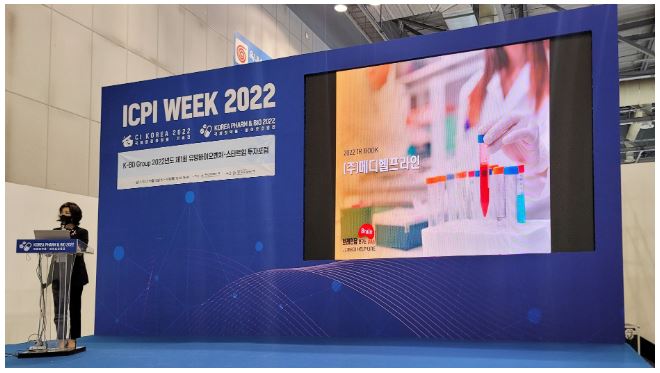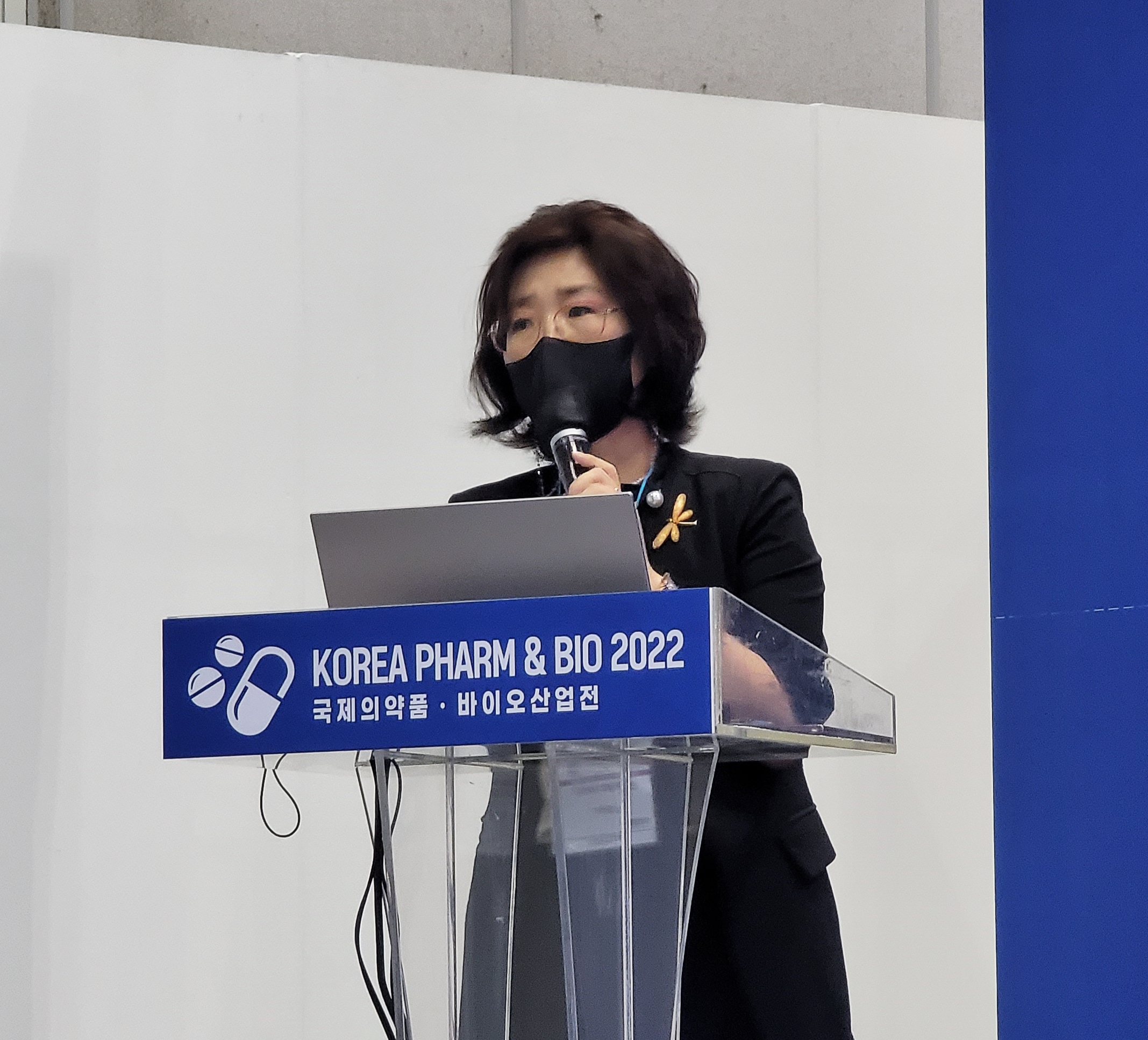MediHelpline Inc. Visible 'Phase 3 Clinical' New Drug for Degenerative…
Page info
Name admin Views 5,533 Datetime 23-06-09 10:152022.June. 20.
This is an article on MediHelpline, which SYP is supporting investment and commercialization.
"MediHelpline is developing a new drug for degenerative brain diseases with autophagy-induced activity, improved mitochondrial function, and anti-inflammatory mechanisms based on autophagy activation platform technology. With the goal of listing on KOSDAQ in 2024, we will achieve the goal by achieving at least two clinical trials and two technology transfers in the U.S. and Korea."
Park Ok-nam, CEO of MediHelpLine, announced the goal of MediHelpLine's listing on KOSDAQ at the 1st Promising BioVenture and Startup Investment Forum of the K-BD Group (Pharmaceutical and Bio Business Development Research Association).
The K-BD Group (Pharmaceutical and Bio Business Development Research Association, Chairman Lee Jae-hyun) held a promising bio-venture and startup investment forum on the 15th. Twenty companies with excellent technology, including new drugs for intractable diseases, anticancer drugs, drug delivery systems (DDS), and new drug target search solutions, participated in the forum to announce their capabilities and R&D pipelines.
MediHelpline started as an RA consulting company in 1998 and expanded to a clinical CRO in 2013, and has established a central research institute since 2016 to develop new drugs. In particular, it was selected as an excellent new drug project by the Ministry of Health and Welfare in 2018 and received 3.3 billion won for phase 2 clinical trials for Parkinson's disease, and in 2020, it was recognized for its excellence in new drug development.
In addition, it has secured candidate pipelines that have entered the second and third phases, such as ▲MH-101 (Parkinson's disease, Ex-WIN1001X) ▲ MH-102 (Alzheimers dementia) ▲ MH-103 (mild cognitive impairment) ▲ MH-201 (diabetic foot ulcer). MH-101 (Parkinson's disease treatment) was approved for phase 3 clinical trials in Korea in March, and MH-201 (diabetic foot ulcer treatment) applied for phase 2 IND in May, all major pipelines are in phase 2 clinical trials, raising expectations for new drug development.
CEO Park Ok-nam said, "MediHelpline is developing new drugs for various indications based on Autophagy platform technology. It can be largely divided into degenerative brain disease groups and chronic wound groups. The most advanced MH-101 (Parkinson's disease) has been approved for phase 3 clinical trials in Korea and is preparing to enter phase 2 clinical trials in the U.S. FDA, he explained.
In particular, MH-102 (Alzheimers dementia), MH-103 (hard cognitive impairment), and MH-201 (diabetic foot ulcer), which have high unmet medical demand, have been approved for phase 2 clinical trials in Korea and are preparing to enter phase 2 this year.
"We are also pursuing a strategy to secure funds for the development of new drugs in the future," he said. "As previous studies have proven safety without toxicity, we plan to continue to generate sales through medical health food for improving brain function, individual certified health functional foods, and skin regeneration dermacosmetics." "We are currently in talks with overseas and domestic retailers," he added.
MediHelpline's entry into a number of clinical trials is known to be due to its continuous investment in new drug development and global-level clinical development capabilities through businesses that currently generate sales.
MediHelpline currently has more than 10 billion won in cash cow, and since 1998, it has been carrying out more than 100 projects annually, including new drug development consulting (non-clinical and IND, NDA), clinical and PV/MPS tasks. Accordingly, it is also famous for having its own new drug development and clinical development capabilities and professional manpower.
CEO Park emphasized, "By removing alpha-synuclein, amyloid-beta 42, and tau protein, which have been identified as the direct cause of death of brain nerve cells through autophagy activation, it is possible to prevent and normalize brain nerve cell death."
"MH-101 (Parkinson's disease treatment) has complex mechanisms such as improving autophagy-lysosomal pathway mitochondrial function and anti-inflammatory," he said. "We expect therapeutic effects to prevent nerve cell death and normalize dopamine secretion."
Looking at the results of phase 2 clinical trials in Korea conducted on 187 patients with MH-101, it was found that symptoms were significantly improved in patients (MDS) with 33 points or more of MDS Movement Disorder Society-Unified Parkinson's Disease Rating Scale (Parkinson Evaluation Scale) Part III.
In addition, significant improvement results were derived in Tremor (the main symptom of Parkinson's patients, tremor symptoms) and depression without treatments. In particular, clinical safety has been confirmed along with the results of the toxicity test, and it is evaluated that Parkinson's treatment, which has strong side effects such as hallucinations and delusions, will overcome the shortcomings.
CEO Park said, "MH-101 has established a phase 2 clinical strategy in the U.S. based on the domestic phase 3 protocol approved in March and the results of the phase 2 clinical trial in Korea," adding, "Other pipelines will also launch domestic and U.S. clinical trials within this year."
The main mechanism, the autophagy induction mechanism, is a self-proposal system that Professor Yoshinori Osumi of Japan has proven the principle through 50 years of research. Since Professor Osmi received the Nobel Prize in Physiology or Medicine in 2016, it has attracted attention as a new mechanism for the development of intractable treatments.
Autophagy refers to a self-farming process in which waste, harmful substances, and abnormal proteins are separated from all cells with nuclei and reused as energy sources. It can be seen as a system that recycles waste.
First, when autophagy is activated, autophagosome docks waste products such as inflammation and toxic proteins in cells, and lysosomes and autophagy fuse. Afterwards, acid hydrolysis through lysosomes is performed, and the decomposed vesicles can be recycled again as metabolites.
related article : https://www.yakup.com/news/index.html?mode=view&cat=12&nid=270681


